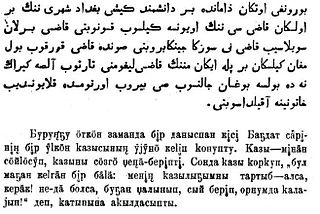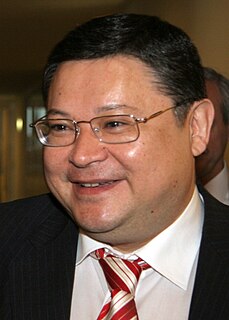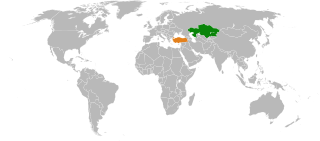
Kazakhstan, the largest country fully within the Eurasian Steppe, has been a historical "crossroads" and home to numerous different peoples, states and empires throughout history.

Foreign relations of Kazakhstan are primarily based on economic and political security. The Nazarbayev administration has tried to balance relations with Russia and the United States by sending petroleum and natural gas to its northern neighbor at artificially low prices while assisting the U.S. in the War on Terror. Kazakhstan is a member of the United Nations, Organization for Security and Co-operation in Europe, North Atlantic Cooperation Council, Commonwealth of Independent States, the Shanghai Cooperation Organisation, and NATO's Partnership for Peace program. Kazakhstan established a customs union with Russia and Belarus, transformed into the Eurasian Economical Community then in 2015 into the Eurasian Economic Union. President Nazarbayev has prioritized economic diplomacy into Kazakhstan's foreign policy.

Kazakh or Kazak, belongs to the Kipchak branch of the Turkic languages. It is closely related to Nogai, Kyrgyz and Karakalpak. Kazakh is the official language of the Republic of Kazakhstan and a significant minority language in the Ili Kazakh Autonomous Prefecture in Xinjiang, China and in the Bayan-Ölgii Province of Mongolia. Kazakh is also spoken by many ethnic Kazakhs through the former Soviet Union, Afghanistan, Iran, Turkey and Germany.

Islam is the largest religion practiced in Kazakhstan, with estimates of between 47% to 70.2% of the country's population being Muslim. Ethnic Kazakhs are predominantly Sunni Muslims of the Hanafi school. There are also small number of Shia and few Ahmadi. Geographically speaking, Kazakhstan is the northernmost Muslim-majority country in the world. Kazakhs make up over half of the total population, and other ethnic groups of Muslim background include Uzbeks, Uyghurs and Tatars. Islam first arrived on the southern edges of the region in the 8th century from Arabs.

Three alphabets are used to write the Kazakh language: the Cyrillic, Latin and Arabic script. The Cyrillic script is used in Kazakhstan and Mongolia. An October 2017 Presidential Decree in Kazakhstan ordered that the transition from Cyrillic to a Latin script be completed by 2025. The Arabic script is used in parts of China, Iran and Afghanistan.
Oralbay Abdykarimov is the State Secretary of Kazakhstan. He served as the head of a state anti-corruption commission after the President appointed him on 29 November 1999 and as Speaker of the Senate, the second highest position in the Government of Kazakhstan, from 1 December to 2004.

Karim Qajymqanuly Massimov is a Kazakh politician who served as Prime Minister of Kazakhstan from 10 January 2007 to 24 September 2012 and again from 2 April 2014 to 8 September 2016.

Kazakhstan – United Kingdom relations were formally established on 19 January 1992. The UK opened an embassy in Kazakhstan in October 1992 and Kazakhstan opened an embassy in the UK in February 1996. Kazakhstan's relations with the West have greatly improved in the last few years as the Government has closely cooperated in the U.S.-led War on Terror. See also: Counter-terrorism in Kazakhstan

The United States and the Republic of Kazakhstan established diplomatic relations on December 16, 1991. The United States was the first country to recognize Kazakhstan's independence. The United States opened its embassy in Almaty in January 1992 and then relocated to Astana in 2006.

Marat Muhanbetuly Tazhin is a Kazakh politician. He served as the Foreign Minister in the Government of Kazakhstan from 2007 to 2009. He previously served as Secretary of the National Security Committee (NSC). In September 2009 he was named an advisor to President Nursultan Nazarbayev and secretary of Kazakhstan's Security Council. Marat Tazhin was appointed First Deputy Head of the Executive Office of the President of the Republic of Kazakhstan in January 2017.

The Kazakh political change in hierarchy of 2007 began on 8 January 2007 when Prime Minister Daniyal Akhmetov unexpectedly resigned and ended with the Senate's confirmation of Karim Masimov as his replacement on 11 January. Akhmetov did not say why he resigned, but political analysts noted increasing criticism from President Nursultan Nazarbayev of his oversight of the economy.

Kazakhstan–Kyrgyzstan relations refers to the bilateral diplomatic relations between the Republic of Kazakhstan and the Kyrgyz Republic. Bilateral relationships between the countries are very strong and Kyrgyz and Kazakh are very close in terms of language, culture and religion. Kyrgyz-Kazakh relationships have always been at very high level and economic and other formal unification of two countries have been greeted with strong appreciation by both nations since the two share a lot in common. On April 26, 2007 the presidents of Kazakhstan and Kyrgyzstan signed an agreement to create an "International Supreme Council" between the two states. This historic event took place during an official visit of the Kazakh president to the Kyrgyzstan capital, Bishkek. Kazakhstan’s direct investment in the Kyrgyz economy has been rapidly gaining pace since the early 2000s. Today Kazakhstan’s economic presence is felt throughout northern Kyrgyzstan, from banks to small businesses, cars with Kazakh plates and numerous tourists. For the most, the Kyrgyz are welcoming these trends as both countries share a similar culture and traditions. During the last five years Kazakhstan invested about 400 million dollars in Kyrgyzstan and is considered the largest investor. Thirty-three percent of the total Kyrgyzstan bank's equity belongs to Kazakh investors. There are about 2,000 enterprises functioning in Kyrgyzstan, and 500 belong to Kazakh entrepreneurs. Kazakh-Kyrgyz unification is in the economic interests of both countries. "I do not see any problem in unification with another country. In the future we should unite with this or another state, anyway. Unification with Kazakhstan will be a good accelerator for our economic development," said lawmaker Juraev.

Kazakh–Turkish relations are foreign relations between Kazakhstan and Turkey. Turkey recognized Kazakhstan on 16 December 1991, being the first state to recognize the independence of Kazakhstan, when Kazakhstan declared its independence. Diplomatic relations between the two countries were established on 2 March 1992. These relations have developed positively on the international stage as well as in commerce and strategic affairs. Kazakhstan has an embassy in Ankara and a consulate general in Istanbul. Turkey has an embassy in Almaty and a branch office in Nur-Sultan.

Azerbaijan–Kazakhstan relations refer to foreign relations between Azerbaijan and Kazakhstan. Azerbaijan has an embassy in Nur-Sultan and a consulate in Aktau. Kazakhstan has an embassy in Baku.

Armenia–Kazakhstan relations are foreign relations between Armenia and Kazakhstan. Before 1918, both countries were part of the Russian Empire, and until 1991, they were both part of the USSR. Diplomatic relations were established between both countries on August 27, 1992. Since 1992, Armenia has maintained an embassy in Almaty. Kazakhstan has an embassy in Yerevan.

The Turkic Council (Azerbaijani: Türk Şurası; Kazakh: Түрік кеңесі, Túrik Keńesi; Kyrgyz: Түрк кеңеш; Turkish: Türk Keneşi; Uzbek: Turkiy Kengash, Туркий Кенгаш; or, in full, the Cooperation Council of Turkic-Speaking States, is an international organization comprising some of the Turkic countries. It was founded on 3 October 2009 in Nakhchivan. The General Secretariat is in İstanbul, Turkey. The member countries are Azerbaijan, Kazakhstan, Kyrgyzstan, and Turkey. The remaining two Turkic states, Turkmenistan and Uzbekistan are not currently official members of the council due to their neutral stance; however, they are possible future members of the council. Uzbekistan announced its intention to join the council on 30 April 2018. The idea of setting up this cooperative council was first put forward by Kazakh President Nursultan Nazarbayev back in 2006.

The International Turkic Academy is an academic center coordinating scientific researches on the language, literature, culture, history of Turkic people from ancient times to the present-day and evaluating the contribution of the Turkic civilization to the human civilization on the basis of indigenous sources. The academy aims to boost the scientific cooperation across the Turkic world, help the initiatives of scholars from Turkic-speaking states and organize academic meetings on a regular basis.
Darkhan Kydyrali is a Kazakh scholar and writer, Doctor of Historical Sciences, professor. In 2014 Dr. Kydyrali had been appointed as the President of the International Turkic Academy. Since July 2016 he has been working as chairman of the board of the Egemen Kazakhstan national newspaper.

















